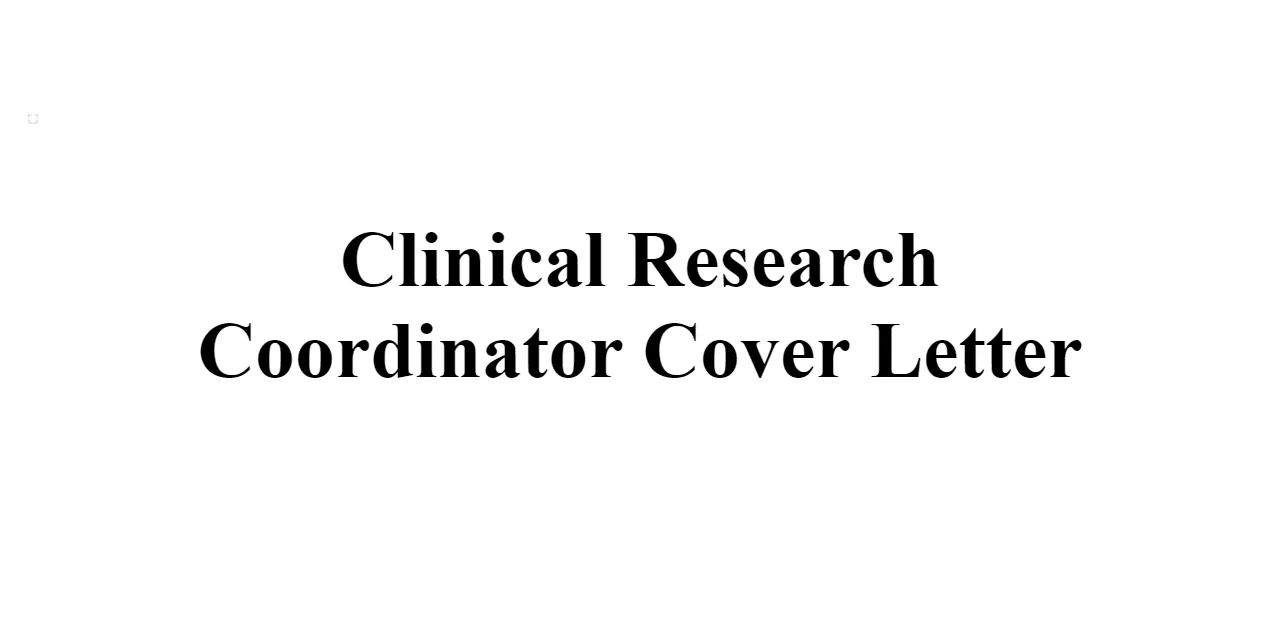The Importance of a Clinical Research Coordinator Cover Letter
A well-crafted cover letter is a crucial component of your application when applying for a Clinical Research Coordinator position. It serves as your first introduction to a potential employer, providing an opportunity to showcase your personality, enthusiasm, and qualifications beyond what is listed on your resume. Unlike a resume, a cover letter allows you to elaborate on specific experiences, explain your career goals, and demonstrate your understanding of the role and the organization. It’s your chance to make a strong first impression and persuade the hiring manager to read your resume closely.
Why a Cover Letter Matters
A cover letter matters because it provides context to your resume. It helps hiring managers understand why you are the best fit for the specific position and the organization. It allows you to tailor your application to the job requirements, highlighting the skills and experiences most relevant to the role. A compelling cover letter demonstrates your communication skills, attention to detail, and genuine interest in the opportunity, making you stand out from other candidates. This is the spot to provide specific examples, use the company’s name, and show why you’re a great match.
Key Components of a Strong Cover Letter
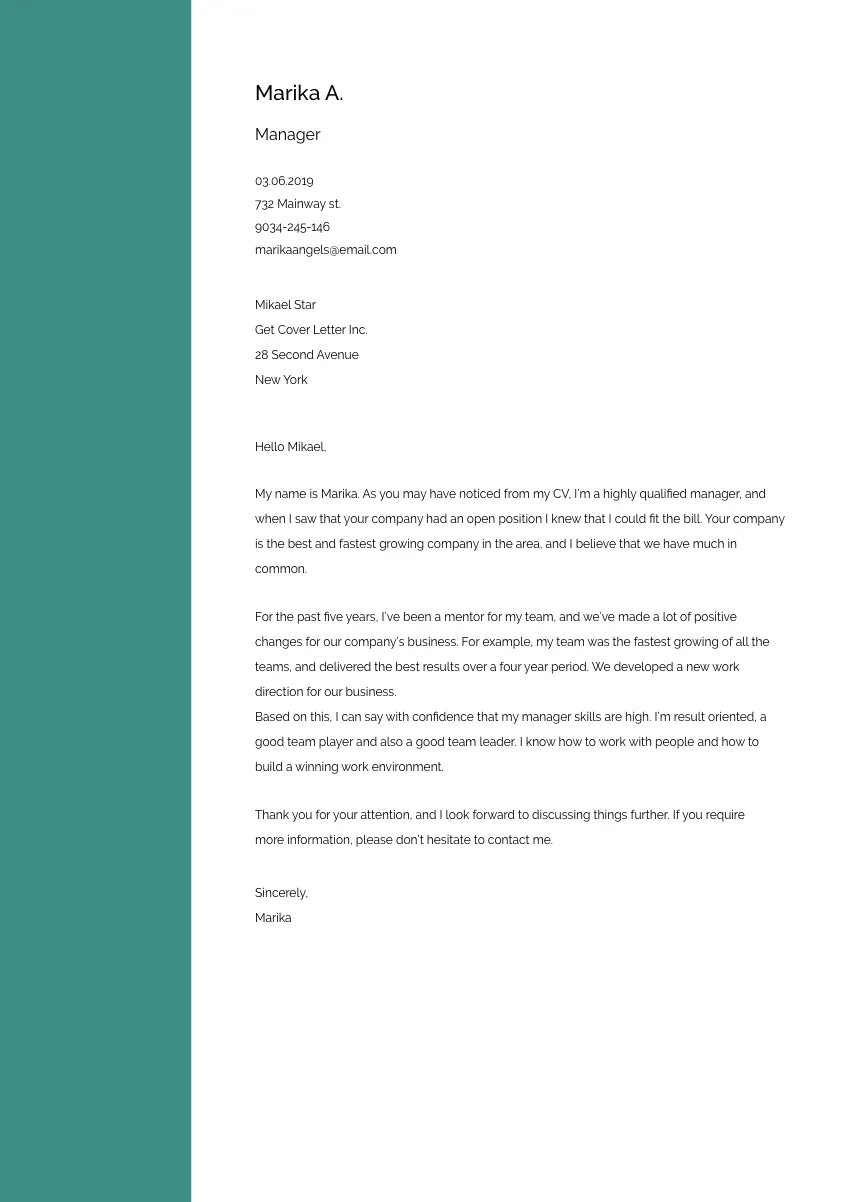
A strong cover letter includes several essential elements. It begins with your contact information and the date, followed by the hiring manager’s name and title. The opening paragraph should capture the reader’s attention, stating the position you’re applying for and expressing your interest. The body of the letter highlights your relevant skills and experiences, providing specific examples to support your claims. It should demonstrate your knowledge of research methodologies, data management, and compliance. Finally, the closing paragraph should reiterate your enthusiasm, include a call to action, and thank the reader for their time and consideration.
Formatting Your Clinical Research Coordinator Cover Letter
Proper formatting is essential for a professional and readable cover letter. Use a clear and easy-to-read font like Times New Roman or Arial, with a font size between 10 and 12 points. Maintain consistent margins (typically 1 inch on all sides) and use single spacing within paragraphs and double spacing between paragraphs. Break your cover letter into logical paragraphs, making it easy for the reader to follow your key points. Proofread meticulously to eliminate any typos or grammatical errors, as this reflects your attention to detail. A well-formatted letter immediately signals that you take the opportunity seriously.
Contact Information and Date
Start your cover letter with your full name, address, phone number, and email address at the top left or right corner. Directly below this, include the date you are submitting your application. Make sure your contact information is current and professional-looking, as this is how the hiring manager will reach you. Double-check the information for accuracy to avoid any potential communication issues. Using a professional email address is critical; avoid using any casual or informal email addresses.
Addressing the Hiring Manager
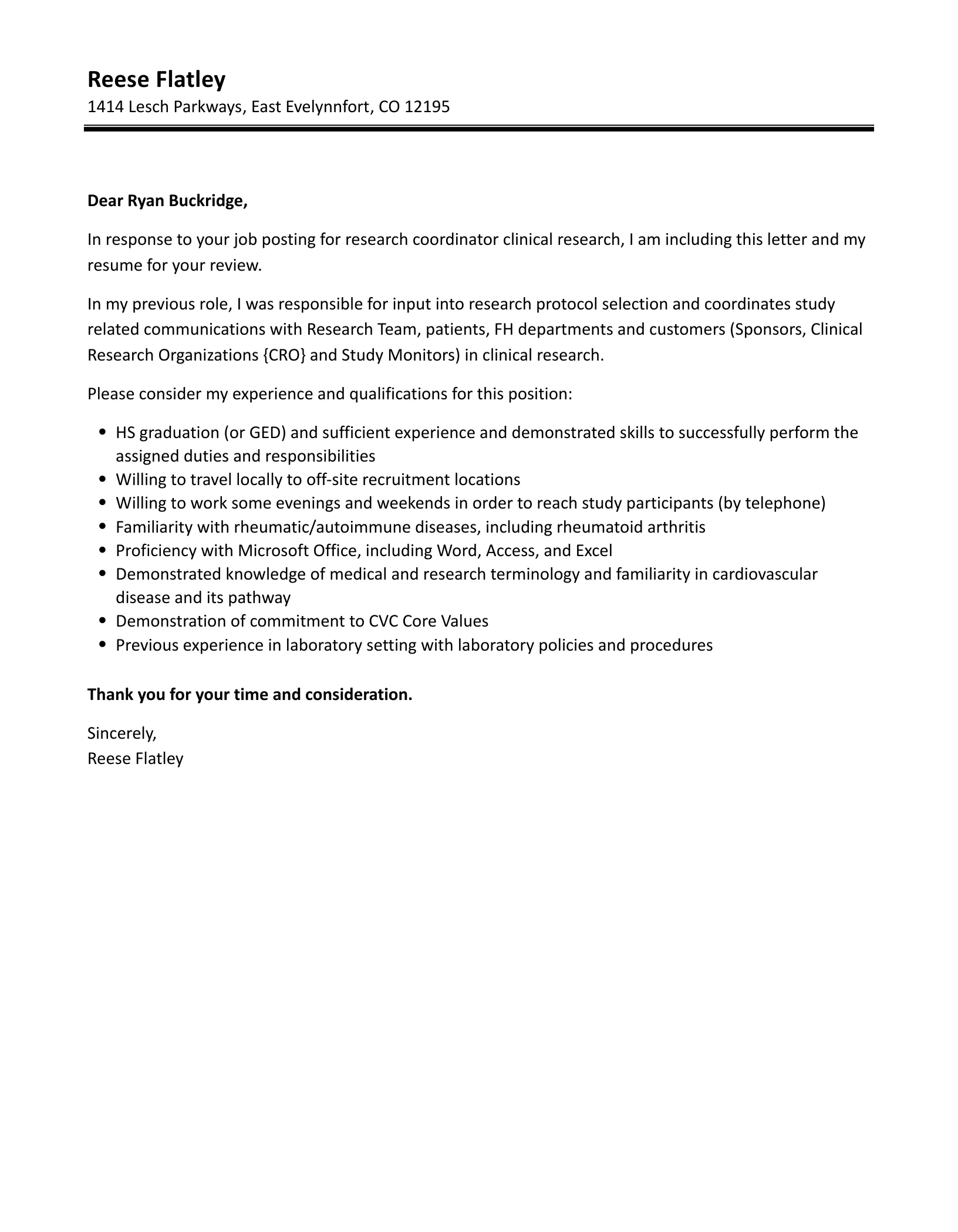
Always address your cover letter to a specific person whenever possible. Research the hiring manager’s name and title through the company’s website, LinkedIn, or the job posting. If you can’t find the name, use a professional greeting like ‘Dear Hiring Manager.’ Avoid generic greetings like ‘To Whom It May Concern,’ which can make your letter feel impersonal. Addressing the letter to a specific person shows that you’ve taken the time to research the organization and that you’re genuinely interested in the opportunity.
Writing a Compelling Opening
Your opening paragraph is your first chance to grab the reader’s attention. State the position you are applying for and where you saw the job posting. Immediately express your interest in the role and the organization. Consider including a brief statement about why you’re drawn to the position or the company’s mission. The goal is to make a strong, positive first impression and encourage the hiring manager to read the rest of your cover letter and resume.
Highlighting Your Skills and Experience
The body of your cover letter is where you highlight your skills and experience, demonstrating why you’re a great fit for the Clinical Research Coordinator role. This section should directly relate your qualifications to the job requirements outlined in the job description. Instead of simply listing your skills, provide specific examples of how you’ve used those skills in previous roles, quantifying your achievements whenever possible. This is your chance to show, not just tell, what you can bring to the position. Tailor each cover letter to the specific job.
Showcasing Relevant Skills
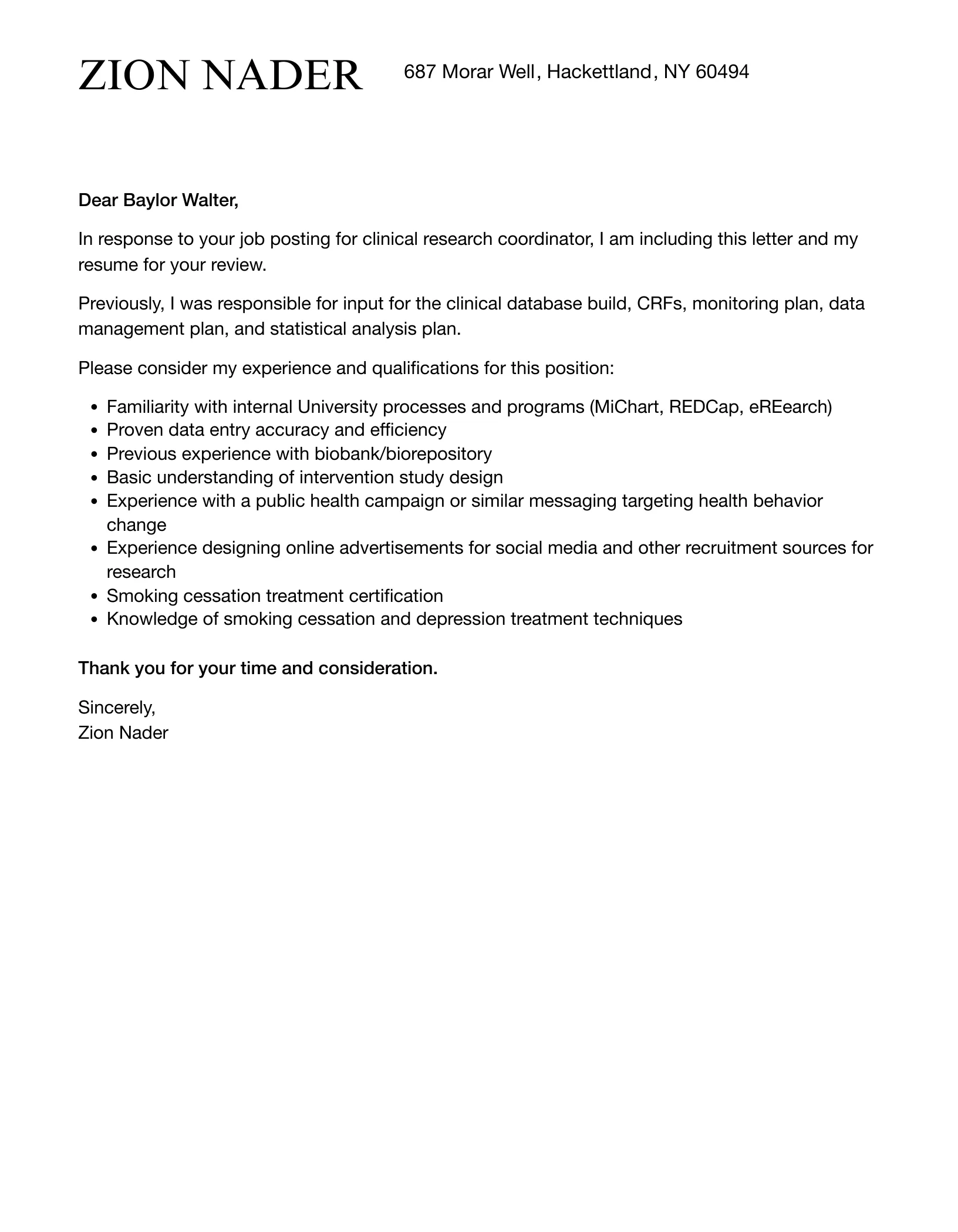
Identify the key skills required for the Clinical Research Coordinator position, such as data management, patient recruitment, protocol adherence, and regulatory compliance. Highlight these skills in your cover letter, providing specific examples of how you’ve utilized them in your previous roles. For example, describe a situation where you successfully managed a complex clinical trial database or implemented strategies that improved patient recruitment rates. Show, don’t just tell; support your claims with evidence that demonstrates your proficiency.
Emphasizing Experience
Detail your relevant experience in the clinical research field. Describe the types of studies you’ve worked on, the protocols you’ve followed, and the roles you’ve held. Highlight your accomplishments and responsibilities, emphasizing how your experience aligns with the job requirements. Use action verbs to describe your duties, such as ‘coordinated,’ ‘managed,’ ‘recruited,’ and ‘monitored.’ The goal is to paint a clear picture of your experience and how it makes you a strong candidate for the position.
Quantifying Achievements
Whenever possible, quantify your achievements to demonstrate your impact. Instead of saying ‘Improved patient recruitment,’ state ‘Increased patient enrollment by 20% within three months.’ Provide specific numbers and data to support your claims, such as the number of patients you managed, the number of protocols you oversaw, or any cost savings you achieved. Quantifiable achievements make your cover letter more persuasive and show potential employers the value you can bring to their organization.
Demonstrating Your Knowledge
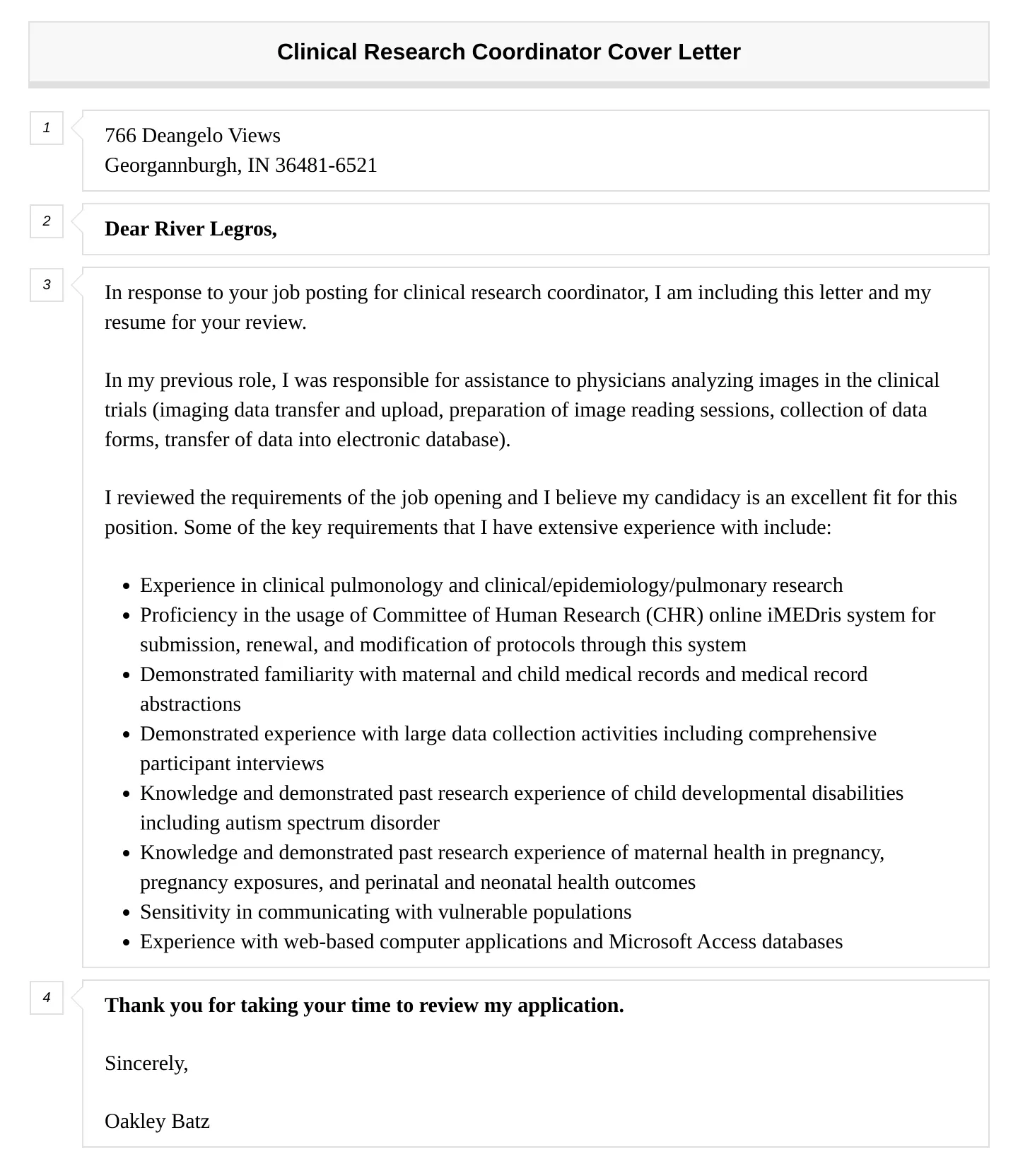
Demonstrate your knowledge of the clinical research process, including research methodologies, data management, and compliance regulations. Show your understanding of the role’s requirements and your ability to contribute to the success of clinical trials. Highlighting this expertise assures the hiring manager that you’re not only qualified but also have a solid understanding of the industry.
Research Methodology Expertise
Show your understanding of research methodologies by highlighting your experience with different types of clinical trials, such as phase I, II, or III trials. Describe your experience with various study designs, including randomized controlled trials. Mention your familiarity with protocols, patient recruitment strategies, and data collection methods. Be clear about how you can apply your research methodology expertise to the specific role.
Data Management Proficiency
Highlight your data management skills, emphasizing your experience with electronic data capture (EDC) systems and other data management tools. Mention your ability to ensure data accuracy, integrity, and completeness. If you have experience with specific software, list them. Showcase your proficiency in managing patient data, handling data queries, and ensuring compliance with data privacy regulations. Focus on your ability to contribute to the efficient and effective management of clinical trial data.
Attention to Detail and Compliance
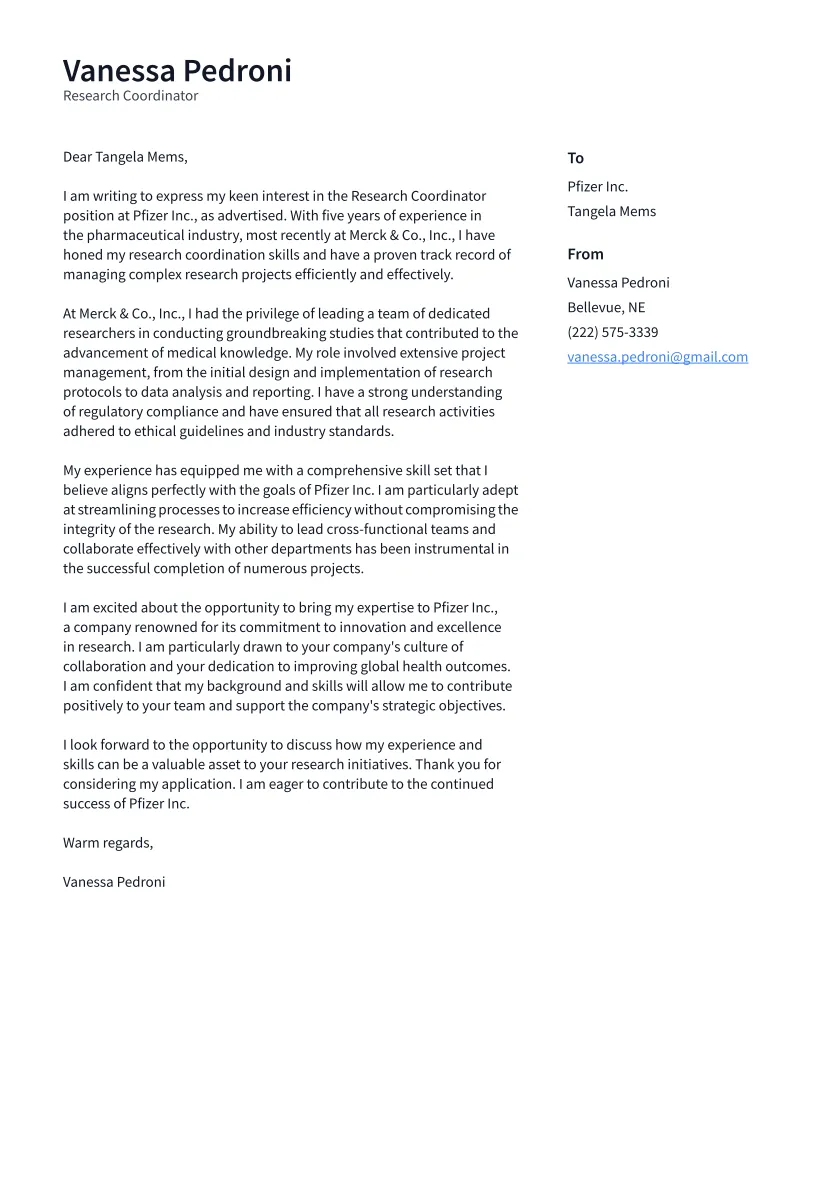
Demonstrate your attention to detail and knowledge of regulatory compliance. Mention your experience with adhering to Good Clinical Practice (GCP) guidelines and other relevant regulations. Show your commitment to patient safety, data integrity, and ethical conduct in clinical research. Describe any experience with regulatory submissions or audits. Highlighting these aspects is critical, as it assures the employer that you can conduct your work according to the high standards required.
Closing Your Cover Letter Effectively
Your closing paragraph should reiterate your interest in the position and the organization. Make sure to include a call to action that encourages the hiring manager to contact you for an interview. Express your gratitude for their time and consideration. A strong closing leaves a lasting impression, reinforcing your enthusiasm and professionalism. A well-crafted cover letter concludes with a strong, confident, and appreciative tone.
Expressing Enthusiasm and Interest
Reiterate your enthusiasm for the position and the organization in your closing paragraph. Show your genuine interest in the role and why you are excited about the opportunity. Mention what specifically appeals to you about the company’s mission, values, or research focus. Expressing genuine interest demonstrates your dedication and commitment to the opportunity. Make it clear that you’re a good fit and eager to contribute.
Call to Action
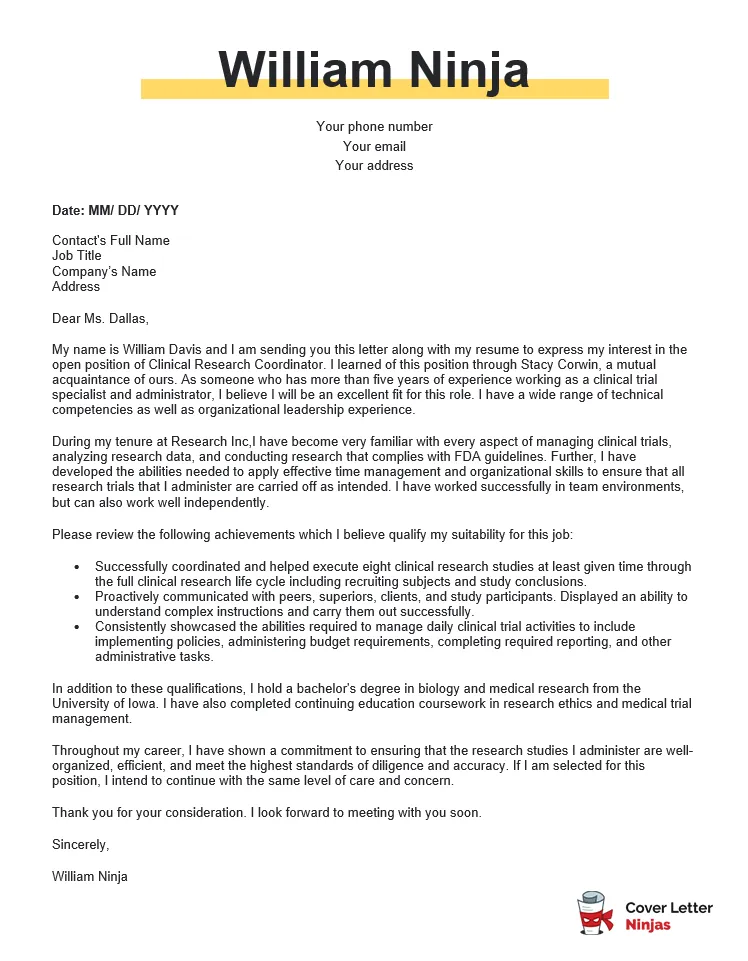
Include a clear call to action in your closing paragraph. State that you are eager to discuss your qualifications further and welcome the opportunity to interview for the position. Provide your contact information again to make it easy for the hiring manager to reach you. Make it easy for them to take the next step by explicitly stating that you look forward to hearing from them soon. The call to action should be confident and professional.
Proofreading and Editing
Before submitting your cover letter, proofread it carefully for any typos, grammatical errors, or formatting inconsistencies. Ensure your cover letter is free of errors, as this reflects your attention to detail and professionalism. Ask a friend or colleague to review your cover letter as a second pair of eyes can often catch errors that you might miss. A polished cover letter shows that you are serious about the opportunity and are committed to presenting yourself in the best possible light. Attention to detail is paramount.
